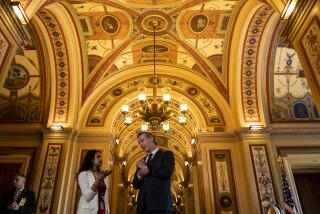Patt Morrison’s interview with Paul R. Ehrlich; Michael Kinsley on housing prices; Gov. Jerry Brown’s plan to put taxes to a vote of the people
- Share via
Will man survive?
Re “Patt Morrison Asks: Saving Earth,” Opinion, Feb. 12
Patt Morrison did a good Q&A with Paul R. Ehrlich. I still have my original copy of his 1968 book, “The Population Bomb.”
However, the article has a misleading title. The crisis we are facing does not involve saving the Earth or even saving the environment. Both will survive with or without our intervention. Rather, the title should have been, “Saving humans.”
No matter what we do, the Earth and its environment will go on, much in the way that the Earth survived when the dinosaurs did not. Perhaps we are only a placeholder — in a small portion of billions of Earth years — waiting for the time that cockroaches will inherit the planet.
Dave Chapel
Santa Ana
Ehrlich says, “I’m very pessimistic about where we’re going, and I’m optimistic about what we could do, but I don’t expect it to happen.”
Exactly. Human beings are a rapacious species. We love our creature comforts, and we love doing what creates human beings.
One only has to look at Congress, where many Republicans deny climate change, want to eliminate the Environmental Protection Agency and seem determined to deny women access to family planning.
With spurious attacks on Planned Parenthood now and soon on the United Nations Population Fund and the Obama administration’s Global Health Initiative, which targets the health of women and girls and has a strong family-planning component, “pessimism” is too weak a term. I like “despairing.”
Jane Roberts
Redlands
In an interview on National Public Radio in 1990, I predicted that the fourth-largest lake in the world, the Aral Sea in central Asia, would within decades turn into a cluster of lifeless, briny lakelets. A visit to Google Earth, alas, provides dramatic proof that this process is right on schedule.
As an endangered species, we ignore warnings from scientists like Ehrlich at our own peril, and at the peril that our posterity will by default inherit from us an ultimately uninhabitable planet.
David McClave
Northridge
A house is also a home
Re “Bursting our bubble,” Opinion, Feb. 15
Michael Kinsley’s assertion that there are only two components that factor into the value of a home (the utilitarian value, which is equal to what a renter would pay, and the investment component) leaves out an important factor: Real-life experience for thousands of years has shown that owning a home is better than renting one.
The Earth stopped creating land long ago, so real estate is, in a sense, the only really important thing for most of us to own. Ever been kicked out by your landlord or had your rent jacked up? Ever had to beg your landlord to change the 20-year-old carpeting? Kinsley shouldn’t use government interference and policies to encourage homeownership to dismiss homeownership as meaningless.
The majority of Americans who don’t write Op-Ed pieces simply want a place to call “home.”
Steve Morton
Irvine
I see the broader point in Kinsley’s Op-Ed article. But comparing the price of gasoline to a house is a poor example of the inconsistency we have about increases or decreases in commodity prices.
Gasoline is a consumable, not unlike a cup of coffee. It has an immediate value, unlike a house. In most cases we buy a house to use and continue using for a variety of reasons. It has a residual value and utility over time. We usually want those things we keep to increase or at least maintain their value.
Sheldon Wright
Temple City
Kinsley says, “The only people who clearly benefit from rising home prices are those who are selling their last house or downsizing. “ I disagree.
All of working-class America benefitted from that last surge in home prices. The millions of homeowners who borrowed against their properties to keep their businesses running or to hire contractors to improve their homes fueled our economic growth. Rising home equity was the only significant increase in lower- and middle-class wealth.
With wages stagnant or declining, jobs outsourced, unions vilified and true wealth siphoned off by Wall Street gamblers, it was the housing bubble that provided the last, dying ember of the American dream. The housing bubble was an irresistible mirage of prosperity to the thirsty.
Mitch Faris
Orange
Brown keeps his promise
Re “The governor’s democracy dodge,” Opinion, Feb. 14
William Voegeli’s contention that Gov. Jerry Brown should have campaigned on a direct pledge of higher taxes is specious. During the campaign, Brown repeatedly stated that he would ask the people of California to vote on increasing taxes. His State of the State message is consistent with his campaign statements.
Voegeli creates a straw man, whom he then ridicules, pretending it represents a position that Brown never took. This technique isn’t new to politics, but it’s one that Republicans have been using with increasing frequency since the Clinton administration.
It’s become threadbare, and Republicans should give it up out of simple embarrassment.
Elliott Smith
Monrovia
Voegeli writes: “It would be ‘unconscionable,’ according to Gov. Jerry Brown, for the Legislature to ‘block a vote of the people’ on a five-year extension of the 2009 tax increases due to expire in June. ‘It is time for a legislative check-in with the people of California,’ he said in his State of the State address.”
How laughable. This is coming from the man who refused to defend Proposition 8 in court as was required by his last job as attorney general. The law was passed by the very same voters he now shows so much concern for.
Joe Solis
Santa Paula
Don’t tread on Roosevelt
Re “A scathing critique of FDR,” Feb. 13
Right-wing historian Burton Folsom Jr. writes in his book that he “remembers his dad, a savings and loan executive, complaining about high taxes and Roosevelt’s craving ambition.”
To write something like that tells me that neither Folsom nor his dad, who could complain about high taxes when millions of Americans didn’t make enough money to even pay taxes, were little touched by the Depression. I’m a child of the Depression. I remember.
The big difference with Franklin D. Roosevelt is that he put the benefits at the bottom of the economic pyramid and let them “bubble up.” President Obama has seen fit to put the benefits at the top and hope they “trickle down.” This effort has had spectacularly little success.
Folsom’s disparaging comments about Roosevelt make people like me, who lived through that terrible period, a little bit ill.
Norman Ewers
Irvine
Discrediting the New Deal is a way of criticizing Obama.
Determining how the economy’s performance is affected by policy is a tricky business. But allowing the big banks and carmakers to go bankrupt would have resulted in the loss of millions of jobs. Obama’s healthcare reform allows millions of Americans with preexisting conditions to qualify for coverage.
FDR and Obama helped people in the country’s time of need. These are facts that cannot be rewritten.
John Wolfenden
Sherman Oaks
Unworthy
Re “Bitter dispute plays out in negotiations,” Feb. 17
I find it hard to believe that there was no news more important than Mel Gibson’s personal problems to put on the front page of The Times. This is the kind of “journalism” that makes longtime subscribers reconsider.
Barbara Gary
Los Angeles
More to Read
A cure for the common opinion
Get thought-provoking perspectives with our weekly newsletter.
You may occasionally receive promotional content from the Los Angeles Times.










